#hippotion
Explore tagged Tumblr posts
Text



Coprosma Hawk Moth (Hippotion scrofa), family Sphingidae, VIC, Australia
photographs by Sharon Abel
1K notes
·
View notes
Text
she's been framed!!

i love how it looks next to the others I'm so happy :)))
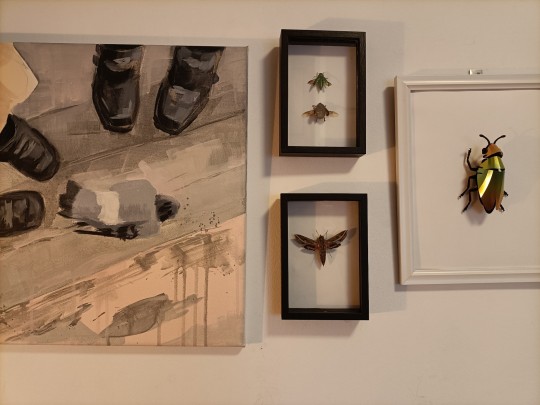
24 notes
·
View notes
Note
where do you think i get it from?
How did you become the god(dess) of wind?
Did you just pop out the womb with clouds for hair?
Were you given your domain?
Did you just ask Zeus for a job one day?
hi ml <3 i missed you :3 and yea i did pop out with blue skin and cloud hair and whenever i cried the winds picked up and when i was calmed down they would calm and they continued to reflect my emotions until i learned to control them, i got full control of the winds around 22 which is why im perma 22, and thats why zeus liked me so much bc we were both weather gods and he cares for everyone but his children :D
#fun fact even in versions where aeolus isnt a child of poseidon#hes the son of some random guy named hippotes#which is basically just horse.#horses follow aeokus everywhere for some reason
494 notes
·
View notes
Text
Silverstripe Hawkmoth (Hippotion celerio)
photos taken by me, don't repost please




#moths#my post#moth art#insect photography#bugblr#biology#entomology#insects#nature#wildlife#artists on tumblr#artwork#photography#wildlife photography
63 notes
·
View notes
Text

Aeolus
Aeolus (Αιολος) is the son of Hippotes.
Ruler/Keeper of the four winds Aeolus was the king of the island of Aeolia, where he lived with his wife and six sons and six daughters.
To ensure safe passage home for Odysseus and his men, Aeolus gave Odysseus a bag containing all the winds, except the west wind. But when almost home, Odysseus' men, thinking the bag contained treasure, opened it and they were all driven by the winds back to Aeolia.
Offerings :
There's not much infos about how Aeolus was worshipped or if he was worshipped at all but I found some (literally 2 sentences in a old website) infos about it.
Back in ancient Greece, lavish offerings were given to Aeolus by dropping them down a sacred well.
Offerings may now be given to the wind. Write your desire on a piece of paper or a tree leaf and let it blow away or just genuine gifts of the heart may be sufficient.
His sacred animal is the horse so images, toys, statues etc.. Of horses can be good offerings.
Blue, light gray or white candles can be used in my opinion but there's no infos on that.
Devotional acts :
Once again, since Aeolus is quite the unknown god, those devotional acts are just my opinion and you can agree or disagree, keep in mind that worship is personal to everyone.
Enjoy windy days and/or pray to him during those.
Listen to the wind.
━━━━━━━━━━━━⊱⋆⊰━━━━━━━━━━━
That's all, I hope you enjoyed it and good luck in your worship experience 🤲🏼🏛️
33 notes
·
View notes
Text
I got curious about Apollo’s lovers after someone pointed out there wasn’t just Hyacinth or Daphne so I looked.
I found out that one kid can have a lot of different candidates for their mother.
Disclaimer: a lot of this comes from Wikipedia. I’ve included their sources in italics. It’s a long, incomplete list.
🎵🎶male🦢
There is Ademetus of Pherae in Thessaly. He was an Argonaut and hunted the Caledonian boar. His wife loved him so much that she exchanged her life for his so he could live until she was supposed to die. She did this with the help of Apollo. At one time Apollo was sent to work for Adementus as punishment for killing Delphyne, the serpent at Delphi. Apollo fell in love and after his punishment served Adementus out of affection.
Maybe Hymensias (Hymen*) god of marriage ceremonies. He’s also a Erotes**. In most stories he’s a son of Apollo by one of the Muses. Sometimes Dionysus is his dad, sometimes it’s Magnes. There seems to be a lot of instances where someone is either a son or lover depending on who’s telling a story. When he’s the son of Magnes, Apollo Falls in love and stays at Magnes house for a while. (Megalai Ehoiai) Unrelated but he and a bunch of women get captured by pirates and he and the women killed thier captors.
Adonis who it’s said “acted like a man with Aphrodite and a woman with Apollo”. (Ptolemy Hephestion, New History Book 5)
Maybe Boreas 🌬️ who’s the personification of the north wind, storms, and winter. You may know his name from the Hyacinth myth. Some of Boreas’ sons, Zetes and Calais, described Apollo as “beloved of our sire”. (Valerius Flaccus)
Branchus was a former Shepard in Miletus in what’s now Türkiye. Apollo gifted him with prophecy and he introduced the worship of Apollo to Didyma in the Ionian part of Türkiye then mysteriously disappeared.
Carnus was Acarnanian Greek and seer who was taught divination by Apollo who helped raise him. But in some stories they are friends and/or lovers. Unfortunately Hippotes used Carnus’ obscure prophesies as an excuse to murder him. And that’s how the Dorians got a plague, Apollo got a new cult, and the Spartans began celebrating the Carnia.
Cinyras was mentioned by Pindar as “beloved of Apollo” and priest of Aphrodite. (Pindar, Pythian Ode 2) Mars murdered him supposedly because he posed a challenge to Apollo. No idea why Mars would be involved, I’m pretty sure Apollo could handle it.
Cyparissus was loved by Apollo. He also accidentally killed his pet stag and turned into a cypress tree. The cypress then became associated with mourning and now it’s found in many cemeteries. The tree is also sacred to Apollo.
Helenus of Troy/Scarmandrios was a son of Priam and Hecuba and twin of Cassandra. Like his sister he was also a prophet. His name was changed from Scarmandrios to Helenus. (Photius Bibliotheca excerpt)
Hippolytus of Sicyon in the Peloponnesus (Plutarch, Life of Numa 4.5)
Iapyx/Lapis was a lover of Apollo who chose healing as his gift instead of prophecy. He became healer to Aeneas and founded the city of Apulia/Puglia in southern Italy, the stiletto part. He may be the brother of Icarus. (Aeneid XII 391-402).
Maybe Phorbas/Phorbaceus, son of Triopas and Hiscilla, prince of Thessaly, and hero of Rhodes. He was either a rival in love of Apollo or actually his lover.
🔮🔮🔮🔮🔮🔮🦢🦢🦢🦢🦢🌿🌿🌿���⬛🐦⬛🐺🐺🐝🐝🐍🐍🐭🐭🐭🐬🐬🐬🐬🐂🐂🌻🌻🌻🏹🏹🏹🎵🎵🎵🐀🐀🐀🤧🤧🤧
🌿female🐍
Acacllis/Acalle, a princess of Crete. A daughter of Minos and Pasiphae and Ariadne’s sister. She may have had multiple children by Apollo and maybe other gods. Acacllis was a Cretan name of A narcissus flower.
Various Muses. Apollo is their leader and occasional lover who has father multiple children by some of them.
Aegle/Coronis the Lapith*** was a princess of Thessaly and mother of Asclepius. Coronis was turned into the constellation Corvus. (According to Istrus).
Celaeno of Phocis mother of Delphus by Apollo. Phocis is the area of Greece that Delphi is in.
Melaens/Melena was the sister of Celaeno and may have been the mom of Delphus by Apollo instead of her.
Aethusa was a daughter of Poseidon and Alcyone. She bore Apollo Eleuther and Linus making her the great grandma of Orpheus. She’s usually identified as a Thracian****
Chione daughter of Daedalion, By Apollo she bore Philammon, maybe. She’s also mother of Autolycus by Hermes. Then she got cocky and bragged that she was hotter than Artemis. Artemis shot her through her tongue, killing her. Her dad didn’t take it well and Apollo had to turn him into a hawk to save him. Philonis has the same story.
Alciope mother of Linus by Apollo. Maybe.
Chrysothemis maybe a lover of Apollo, she was a poet. She’s also the daughter in law to Dionysus and Ariadne.
Rhoeo was mother of Anius by Apollo. Her mom was Chrysothemis by Staphylus making her grand daughter of Dionysus and Ariadne.
Anchiale according to Servis, she was the mother of Oaxes by Apollo. Maybe.
Areia was a nymph from Crete, daughter of Cleochus, and mother of Miletus by Apollo. (Apollodorus, 3.1.2)
Arsinoe may have been mother to Asclepius instead of Coronis. She also had a daughter by Apollo. Arsinoe was honored as a heroine in Sparta.
Corycia was a naiad from the springs of the Corycian cave on Mt Parnassus in Phocis. She had a son, Lycorus, by Apollo.
Cyrene/Kyrene the lion killer was a Thessalian princess and queen of Cyrene. She killed a lion w/her bare hands and Apollo thought it was hot. She had Aristaeus, Atuchus, and Idmon by Apollo. Idmon was a seer, Aristaeus became a god. Apollo made her queen of Cyrene in NE Libya.
Dia may have been the mother of Dryops by Apollo.
Evadne, Apollo was her first love. She conceived a child, Iamus, on her.
Hecuba was queen of Troy and may of had 2 kids with Apollo, Hector and Troilus. According to Stesichorus,Hecuba was rescued by Apollo during the sack of Troy. She may have been turned into a dog in 2 different stories, one because of her reaction to being given to Odysseus as a slave. In either story This allowed her to escape, now she travels with Hecate.
Hyria/Thyria/Hyrie/Thyrie was mother of Cycnus/Cygnus. May have been turned into a swan like her son.
Issa/Amphissa. Her story was woven by Arachne during her contest with Athene. Achilles may have used this name when he pretended to be a woman.
Leuconoe was a daughter of Lucifer and mother of Philammon. Maybe.
Othreis was an oread in a relationship with Zeus and Apollo. With Apollo she had Phager.
Parthenope of Leleges*****daughter of king Ancaeus of Samos and Samia. She had one of the Lycomedes by Apollo.
Phthia was mother of Doris, Laodocus, and Polypoetes.
Psamathe her chile was torn apart by dogs sometime after she abandoned him. Her father had her murdered for some reason and Apollo avenged her and the child’s death with a plague.
Rhodoessa bore the hero Ceos.
Stilbe was the mother of Centaurus and Lapiths. Centaurus is the ancestor of Centaurs.
Syllis was mother of Zeixippus.
Thero, daughter of Phyla’s and Leipephilene, mother of Chaeron
Thyia is associated with the cults of multiple gods. One of the candidates of the mother of Delphos by Apollo.
Zeuxippe is daughter Athamas and maybe mother of Ptous. Ptous is also an epithet of Apollo.
*no relation to the body part.
**In some myths, Eros is separated into multiple deities called Erotes collectively.
***Lapiths were a legendary ethnic group who lived in Thessaly in the Pineios valley. They were related to centaurs and were excellent horsemen. Unlike their centaur cousins, Lapiths looked like regular humans. They were descended from Apollo. They also fought with the centaurs and won. (centauromachy)
****Thracians were cultures that lived in Bulgaria, Romanian, N Greece, and NW Türkiye. It seems to be an umbrella term, like Celtic or Slavic.
*****Leleges we’re president Greek inhabitants of parts of Greece
14 notes
·
View notes
Note
Fine! @urbestestwindgod I will just ask him myself! Darling, get over here!
If you want to get revenge on poseidon, here's what you should do
He says he doesn't have favorites but he does, his daughter Rhode. Hurt her and I promise you, that will hurt him more than a trident ever could
I'm not hurting a real child...
#rp: poseidon gaiêochos#rp: amphitrite khrysêlakatos#rp: aeolus hippotadês#(Hippotadês - “keeps horses on a tight rein”/“son of hippotes”#aww you *know* me#i will take the suffering from you#dyinnngggg#XD
194 notes
·
View notes
Note
I know it’s because even the mythographers gets confused, but I still get kinda irritated every time someone conflates Aeolus the wind lord from the Odyssey, with Aeolus the child of Poseidon. The wind lord Aeolus is not a child of Poseidon, their father is a mortal man named Hippotes. Aeolus son of Poseidon was a mortal king who founded the real existing Aeolian Islands that don’t fly.
.
9 notes
·
View notes
Note
Hi! Do you have, by any chance, any informations about the child of Melanippe (Chiron's daughter)? Both Theoi and Wikipedia gave me a headache, especially because there are different figures with the exact same name, as well as figures with different names whom Wikipedia identifies with each despite the fact that the sources they give do not seem to suggest any connection between them?...
Ok, I tried to look this up and I got hopelessly confused. It seems that the source that provides most accounts of this particular Melanippe is Hyginus' Astronomy, where her child by Aeolus remains unnamed. However, there are too many women named Melanippe and waaay too many men named Aeolus. I mean, just in this account there are three guys whose name is Aeolus:
"In the times before that which we are discussing the rest of the sons of Aeolus, who was the son of Hellen, who was the son of Deucalion, settled in the regions we have mentioned, but Mimas remained behind and ruled as king of Aeolis. Hippotes, who was born of Mimas, begat Aeolus by Melanippê, and Arnê, who was the daughter of Aeolus, bore Boeotus by Poseidon. But Aeolus, not believing that it was Poseidon who had lain with Arnê and holding her to blame for her downfall, handed her over to a stranger from Metapontium who happened to be sojourning there at the time, with orders to carry her off to Metapontium. And after the stranger had done as he was ordered, Arnê, while living in Metapontium, gave birth to Aeolus and Boeotus, whom the Metapontian, being childless, in obedience to a certain oracle adopted as his own sons." (Diodorus Siculus, Library of History 4.67.3-4).
I hate mythological genealogies! There is a Melanippe here as well, but is she the Melanippe daughter of Chiron? The first Aeolus mentioned here, son of Hellen, is the father of Chiron's daughter's child in the account of Hyginus, whereas this Melanippe mates with Hippotes, son of Mimas and gives birth to another Aeolus. They are likely different figures even though the theoi site suggests otherwise.
In Euripides' fragmentary "Wise Melanippe" it seems that the eponymous character is a daughter of Aeolus the son of Hellen while her mother is Chiron's daughter, here named Hippo. So Chiron's daughter, Melanippe/Hippo/Hippe/Thetis/Ocyrhoe or whatever her name may be, is the mother of another Melanippe.
7 notes
·
View notes
Text





@grow-and-decay submitted: A little assortment of bugs from [removed] NSW, Australia (please remove ‘[removed]’ part). First two pictures are the same insect.
I’m pretty sure the little green one is a leafhopper of some sort and the moth is Sphingidae, but any other info is appreciated :)
Your other message you sent was correct and the first dude is indeed a hoverfly. Maybe a female common halfband. The green dude is actually a Dictyopharid planthopper rather than a leafhopper. The only similar species I could find in your area would be Hasta hastata, so maybe that!
You're also right the moth is a sphinx moth! Specifically looks like a coprosma hawk moth, Hippotion scrofa. The spider, as far as I can tell just from that photo, is a prowling inland spider, Ceryerda cursitans, which is a type of ground spider in the family Gnaphosidae.
#spider#submission#arachnids#bugs#insects#animals#fly#diptera#hoverfly#common halfband#planthopper#true bugs#moth#sphinx moth#coprosma hawk moth#ground spider#prowling inland spider
54 notes
·
View notes
Text
The Anemoi
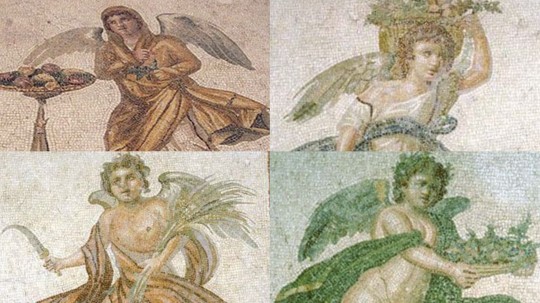
Hesiod, Theogony 869 ff :
"Notos (the South Wind) and Boreas (the North Wind) and clear Zephyros (the West Wind). These Winds are a god-sent kind, and a great blessing to men."
The Anemoi are the gods of the winds, especially the main four, but there are up to 24 different winds. Eight of these winds appear on Wind Towers, like the one in Athens, and act as both a devotional object, as the winds were often worshiped together as the Anemoi, and as a directional tool.
The Anemoi are all ruled by Aeolus, son of Hippotes, who was appointed to this position by Zeus. The winds themselves are the children of Eos, goddess of the dawn, and her husband Astraeus, an astrological god also associated with dusk/twilight.
In mythology and poetry, they often appear as tools of the Olympians, especially Zeus and Poseidon, who can command the winds to help in their endeavors, though they do appear helping other gods as requested. However, the witch Medea also calls on the Anemoi to aid in her magic.
Ovid, Metamorphoses 7. 192 ff (trans. Melville) (Roman epic C1st B.C. to C1st A.D.) :
"[The witch] Medea . . . in the deep stillness of the midnight hour . . . To the stars she stretched her arms, and thrice she turned about and thrice bedewed her locks with water, thrice a wailing cry she gave, then kneeling on the stony ground, ‘O Nox (Night) [Nyx], Mother of Mysteries, and all ye golden Astra (Stars) who with Luna (the Moon) [Selene] succeed the fires of day, and thou, divine triceps (three-formed) Hecate, who . . . dost fortify the arts of magic, and thou, kindly Tellus (the Earth) [Gaia], who dost for magic potent herbs provide; ye Venti (Winds) [Anemoi] and Aurae (Airs) . . . be with me now! By your enabling power, at my behest . . . my magic song rouses the quiet, calms the angry seas; I bring the clouds and make the clouds withdraw, I call the winds and quell them.’"
From this, other ancient magical practioners took inspiration.
Pausanias, Description of Greece 2. 12. 1 (trans. Jones) (Greek travelogue C2nd A.D.) :
"In Titane there is . . . an Altar of the Anemoi (Winds), and on it the priest sacrifices to the Anemoi (Winds) one night in every year. He also performs other secret rites [of Hekate (Hecate)] at four pits, taming the fierceness of the blasts [of the winds], and he is said to chant as well the charms of Medea."
The Ruler of the Anemoi - Aeolus
Aeolus is the God of the Winds and the king of the island of Aeolia. He was appointed as Keeper of the Winds by Zeus. Aeolus supposedly kept the most brutal of winds trapped in a cave on Aeolia. He was sometimes petitioned to let them loose to aid in some cause, by both gods an mortals. He is sometimes portrayed as a face in the sky blowing on some object, a trait he shares with all of the Anemoi. His sacred animal is the kingfisher.
His most famous appearance by far is his role in Homer's Odyssey:
Homer, Odyssey 10. 1 ff (trans. Shewring) (Greek epic C8th B.C.) :
"[Odysseus tells the tale of his wanderings :] We came to the Aiolian (Aeolian) island (nesos Aiolios); here lived Aiolos (Aeolus) Hippotades (son of Hippotas); the deathless gods counted him their friend. His island is a floating one; all round it there is a wall of bronze, unbreakable, and rock rises sheer above it. Twelve children of his live in the palace with him; six are daughters, six are sons in the prime of youth; moreover the king has given his daughters as wives to his sons. These all hold a continual feast with their dear father and much-loved mother; countless dainties are there before them, and through the daytime the hall is rich with savoury smells and murmurous with the sound of music. At night they sleep, each with his own chaste wife, on inlaid bedsteads with coverlets over them.
To their city and noble palace we now came, and for a whole month Aiolos gave me hospitality and questioned me on all manner of things, Ilion [i.e. Troy] and the Argive ships and how the Akhaians (Achaeans) sailed for home. I duly told him all he desired; then in my turn I asked his leave to depart and begged him to help me on my way. Nor was he unwilling; he set about speeding my return. He gave me a bag made from the hide of a full-grown ox of his, and in the bag he had penned up every Wind (anemos) that blows whatever its course might be; because Kronion (Cronion) [Zeus] had made him warden of all the Winds (anemoi), to bid each of them rise or fall at his own pleasure. He placed the bag in my own ship's hold, tied with a glittering silver cord so that through that fastening not even a breath could stray; to Zephyros (the West Wind) only he gave commission to blow for me, to carry onwards my ships and men. Yet he was not after all to accomplish his design, because our own folly ruined us.
For nine days and through nine nights we sailed on steadily; on the tenth day our own country began to heave in sight; we were near enough to see men tending their fires on shore. It was then that beguiling sleep surprised me; I was tired out, because all this time I had kept my own hands on the steering-oar, never entrusting it to one of the crew, for I wished to speed our journey home. Meanwhile the crew began murmuring among themselves; they were sure I was taking home new presents of gold and silver from Aiolos.
One of them would say as he eyed his neighbour : ‘What injustice! In whatever city or land he comes to, this man wins everyone's friendship and regard. He is taking back a mass of fine things from the spoils of Troy, while we who have journeyed with him from the first to last are returning home all empty-handed. And now come these latest gifts that Aiolos in his hospitality had indulged him with. Come, let us look without wasting time. What are these gifts? How much gold and silver is there inside the bag?’
Thus the men talked among themselves, and the counsels of folly were what prevailed. They undid the bag, the Winds (anemoi) rushed out all together, and in a moment a tempest (thuella) had seized my crew and was driving them--now all in tears--back to the open sea and away from home.
I myself awoke, and wondered if now I should throw myself overboard and be drowned in ocean or if I should bear it all in silence and stay among the living. I did bear it and did remain, but covered my face as I lay on deck. My own ship and the others with it were carried back by raging storm (anemos thuella) to the island of Aiolos (nesos Aioloios), amid the groaning of all my company.
There we set foot ashore and drew water, and without delay my crews and I took our meal by the rapid ships. When we had had our portion of food and drink, I chose to come with me one man as my own attendant and one besides; then I sent up to the place of Aiolos, and found him feasting there with his wife and children. We went in and we sat down at the threshold by the doorposts, while the household asked in deep amazement : ‘Odysseus, how is it that you are here again? What malicious god has set upon you? Surely we did our best before to speed you upon your way, meaning to reach your own land and home or whatever place you might desire?’
So they spoke, and I said despondently : ‘Faithless comrades were my undoing, they and the slumber that betrayed me. But you are my friends; you have the remedy; grant it me.’
With these humble words I made my appeal to them. They remained in silence, except the father, who answered me : ‘Away from this island, away at once, most despicable of creatures! I am forbidden to welcome here or to help send elsewhere a man whom the blessed gods abhor. This return reveals you as god-forsaken; go!’
And with these words he drove me forth despite my pitiful lamentations. Then we sailed onwards sick at heart."
The Four Cardinal Winds
Boreas (Roman name: Aquilo/Septentrio)
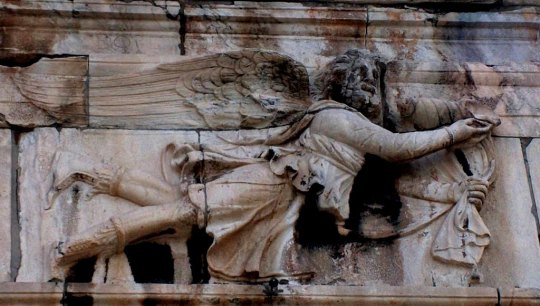
Of all the Anemoi, Boreas is the one we have the most information about. He is the god of the north wind and is associated with cold temperatures and the mountains in the north of Greece, and therefore, the element of earth. From his name, we get the term aurora borealis. Boreas was famous for his strength and temper. He is often depicted with shaggy hair and beard, with a billowing cloak and a conch shell in his hands. His sacred animal is the horse.
He is represented on ancient compass roses in the north with the name Septentrio.
In mythology:
Boreas delivered Leto to Poseidon by order of Zeus, so Poseidon could take her to the island of Ogygia where she would be safe to give birth to Apollo and Artemis.
Boreas was said to have kidnapped an Athenian princess he had taken a shine to named Orithyia. Originally, he had attempted to convince her to come with him, but when she refused, he kidnapped her instead, showing the temper he was well known for. She did not consent, but their children include sons Zethes and Calais (of Argonaut fame), Chione, the goddess of snow, and another daughter named Cleopatra (unrelated to the Egyptian queen). It is through his relationship with Orithyia that he came to be a "son-in-law" of Athens and the Athenians.
In another story, Boreas competed with Pan for the affections of a nymph named Pitys. Boreas tried to prove his might by uprooting all of the trees. Unfortunately, Pan only laughed at Boreas' show of strength and his joviality won Pitys' affection. Angered by her rejection, Boreas threw Pitys' off a cliff, where she died. Gaia took pity on the nymph and transformed her into a pine tree.
In an Aesop fable, Boreas competed with his uncle, Helios, to get a travelling passerby to remove his cloak, in an attempt to prove which god was strongest. Boreas tried to blow the cloak off the man, but the harder he blew, the tighter the man wrapped the cloak around himself. Helios instead, made the sun shine bright and heat the land. The man removed his cloak when it got too hot. The moral of the story is that persuasion is better than force.
According to Pausanias, Boreas blessed Musaeus of Athens with the gift of flight.
Pausanias, Description of Greece 1. 22. 7 (trans. Jones) (Greek travelogue C2nd A.D.) :
"I have read verse in which Musaios (Musaeus) [the poet] receives from Boreas the gift of flight, but, in my opinion, Onomakritos (Onomacritus) wrote them."
[N.B. Musaios and Onomakritos were both Orphic poets.]
There are many claims that Boreas, in the form of a stallion, impregnated mares across the ancient world, and variations on these stories appear in Homer's Iliad and Virgil's Georgics 3.
In the Orphic Hymns, Boreas is also listed as a god of the season of winter.
Orphic Hymn 80 to Boreas (trans. Taylor) (Greek hymns C3rd B.C. to 2nd A.D.) :
"To Boreas (the North-Wind), Fumigation from Frankincense. Boreas, whose wintry blasts, terrific, tear the bosom of the deep surrounding air; cold icy power, approach, and favouring blow, and Thrake (Thrace) awhile desert, exposed to snow: the air's all-misty darkening state dissolve, with pregnant clouds whose frames in showers resolve. Serenely temper all within the sky, and wipe from moisture aither's splendid eye."
The cult of Boreas:
Boreas was worshiped as a protector of Athens and sacrificed to when the city needed protection, though it is unknown exactly what these sacrifices were.
There are a few different accounts, but the main plot is this:
The Athenians received a message from an oracle that to protect the city, they should call on their ally who was a "son-in-law" of Athens/the Athenians. Boreas was considered a son-in-law of Athens because of his marriage to Orithyia, who was an Athenian princess. The Athenians made sacrifices to both Boreas and Orithyia in the hopes that they would destroy a barbarian fleet threatening them. The fleet was destroyed and a special district dedicated to Boreas was created.
Notos (Roman name: Auster/Australis, Notus when the Greek name was retained with Latin spelling)

Notus is the god of the south wind and is associated with winds from the sea to the south of Greece. He is usually depicted pouring water from a vase, like rain on crops. The winds he brings are hot. He is also said to be responsible for the storms of late summer and early autumn in Ancient Greece and Rome, indicating that his winds are both hot and moist, carrying moisture from the Mediterranean sea to the south onto the continent to the north, corresponding to the element of water. He was also feared as a destroyer of crops. On ancient compass roses, he is represented by the name Australis, from which the name Australia is derived. Notus does not have any sacred animal mentioned for him alone, but the horse is sacred to the Anemoi as a group.
The Romans associated him with the clouds and harsh winds and storms that would blow in from the south.
In Mythology:
Notus does not appear prominently in mythology outside of helping the other gods when called upon, usually with his brothers.
In the Orphic Hymns, Notus is associated with the season of Summer.
Orphic Hymn 82 to Notus :
"To Notos (Notus, the South-Wind), Fumigation from Frankincense. Wide-coursing gales, whose lightly leaping feet with rapid wings the air's wet bosom beat, approach, benevolent, swift-whirling powers, with humid clouds the principles of showers; for showery clouds are portioned to your care, to send on earth from all-surrounding air. Hear, blessed power, these holy rites attend, and fruitful rains on earth all-parent send."
Euros (Roman name: Vulturus/Volturus, but Roman poets often retained the Greek name with the Latin spelling Eurus)
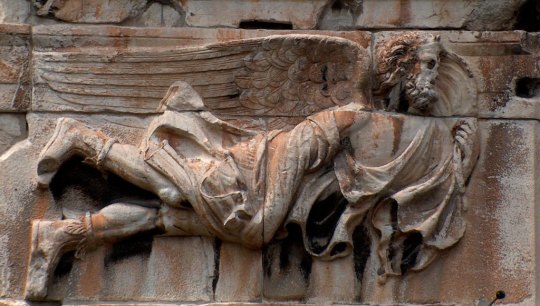
Euros is the god of the east wind and dwelt near the palace of Helios, his uncle. He is said to bring a hot wind, and with his close proximity to Helios, is associated with the element of fire. Little else is known about Euros, as he is the least mentioned of all the Anemoi. Euros is depicted as a bearded man holding a heavy cloak. No animal is known to be sacred specifically to Euros, but horses are sacred to all of the Anemoi as a single group.
In Mythology:
Most references to Euros in mythology are passing. Most of what is attributed to Euros comes from the poets of the time, including Homer, Virgil, and Ovid.
One source lists Euros as the "Savior of Sparta."
Greek Lyric V Folk Songs, Frag 858 (from Strasbourg papyrus) (trans. Campbell) (B.C.) :
"Send a breeze then, over the fields . . . soft wind . . . Euros (East Wind) : Euros, saviour of Sparta, may you come with victory at all times! Ie Paian, ieie Paian!"
Euros is unofficially the god of Autumn. He fills the fourth seasonal slot most modern people associate with autumn, however, the ancient Greeks only recognized three seasons. There are no mentions of him in the Orphic Hymns.
It is important to note that Euros sometimes appears as the god of the southeast wind and Apeliotis as the east wind. Apeliotes also has associations with autumn.
Zephyros (Roman name: Favonius, Zephyrus when the Greek name was retained with Latin spelling)

Zephyros is the god of the west wind and is depicted as a beardless youth scattering flowers from his mantle, often with wings, associating him with the element of air (though, arguably all of the Anemoi are related to air). He and his winds were said to be most gentle and provided ships with favorable winds for sailing. He was known as the fruictifying wind and the messenger of spring. He is sometimes depicted as carrying a basket of unripe fruit. His sacred animals are his offspring, the horse and the tiger.
In Mythology:
Zephyros most famously appears in the myth of Apollo and Hyacinthus. Both gods were in love with a Spartan man named Hyacinthus. Apollo and Hyacinthus often spent time together, and one day, started a game of discus. Zephyros spotted them, and in a jealous rage, blew the discus off course, which then struck Hyacinthus in the forehead and killed him. Apollo, in his grief, turned Hyacinthus into a flower (either an iris or larkspur, depending on the telling).
Zephyros vied with his brother, Boreas, for the love of the nymph, Chloris (Flora in Roman mythology). Boreas, however, stole Orithyia from her father's home instead, allowing Zephyros to pursue Chloris uncontested. He married Chloris and made her the goddess of flowers.
Zephyros also had a relationship (or marriage, depending on the source) with the messenger of the Olympians and goddess of rainbows, Iris. Sometimes, they are listed at the parents of the Erotes: Pothos, Eros, and Himeros, though other accounts list their mother as Aphrodite. In other accounts, Eros was the son of Iris and Zephyros (or Aphrodite), and Pothos and Himeros the children of Eros, making them the grandchildren of Iris and Zephyros (or Aphrodite).
In the story of Eros and Psyche, it is Zephyros who delivers Psyche to the home of Eros.
Through the harpy Podarge, Zephyros was the father of the horses of Achilles, Balius and Xanthus, mirroring his opposite brother Boreas's association with horses.
Roman mythology gives him the additional domain of plants and flowers
In the Orphic Hymns, Zephyros is associated with Spring.
Orphic Hymn 81 to Zephyrus :
"To Zephyros (Zephyrus, the West-Wind), Fumigation from Frankincense. Sea-born, aerial, blowing from the west, sweet Breezes (Aurai, Aurae), who give to wearied labour rest. Vernal and grassy, and of murmuring sound, to ships delightful through the sea profound; for these, impelled by you with gentle force, pursue with prosperous fate their destined course. With blameless gales regard my suppliant prayer, Zephyros unseen, light-winged, and formed from air."
The Cult of Zephyros:
There were two known temples to Zephyros, one on the Isle of Rhodes, and the other in the town of Laciadae. It is also said that the Argonauts made an altar to Zephyros, among others, while preparing to depart on a voyage.
The Lesser (Tertiary) Winds
These wind gods cover the tertiary directions and are featured on wind towers and early compass roses, but little is known about them.
Lips (Roman name: Africus)
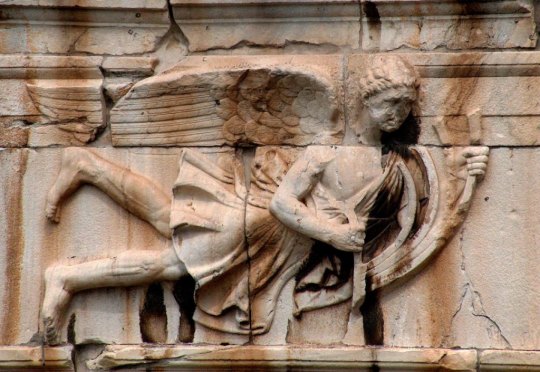
Lips is the god of the southwest wind and is depicted on the Tower of the Winds in Athens as a winged man holding the stern of a ship. He was a favorite of sailors.
KAIKIAS (Roman name unverified)
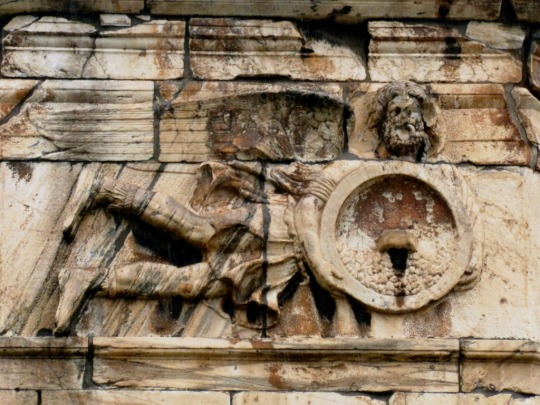
Kaikias is the god of the northeast wins and is portrayed as a bearded man with a shield full of hail-stones. These hail stones may reference severe, destructive storms.
APELIOTES (Roman name unverified)

Apeliotes is the god of the southeast wind and is depicted as a clean-shaven man, holding a cloak full of fruit and grain. He is associated with autumn and sometimes switches places with Euros.
SKIRON (Roman name unverified)
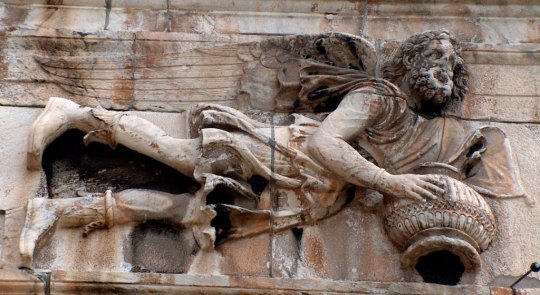
Skiron is the god of the northwest wind and depicted as a bearded man tilting a cauldron, potentially signifying the onset of winter. He is also associated with violent storms and winds.
82 notes
·
View notes
Note
(Yep. There’s Aeolus, son of Hellen, who the Aeolian Greeks were named after. Aeolus, son of Poseidon (and grandson of the first Aeolus), who went the Tyrrhenian Sea and founded the Aeolian Islands (a real place). Aeolus, son of Hippotes, the ruler of the Winds and of the island Aeolia (the floating island). Those three get mixed up sometimes. Them there’s Aeolus of Thebes, and Aeolus of Troy, who aren’t very important.)
huh, ok
3 notes
·
View notes
Text
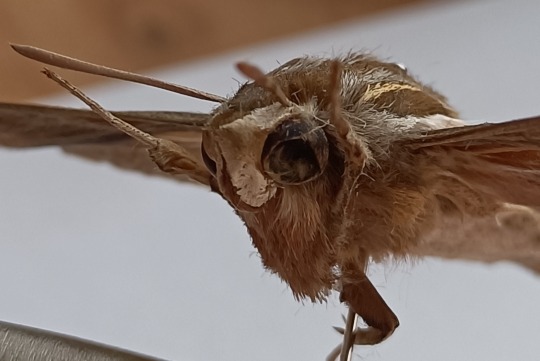


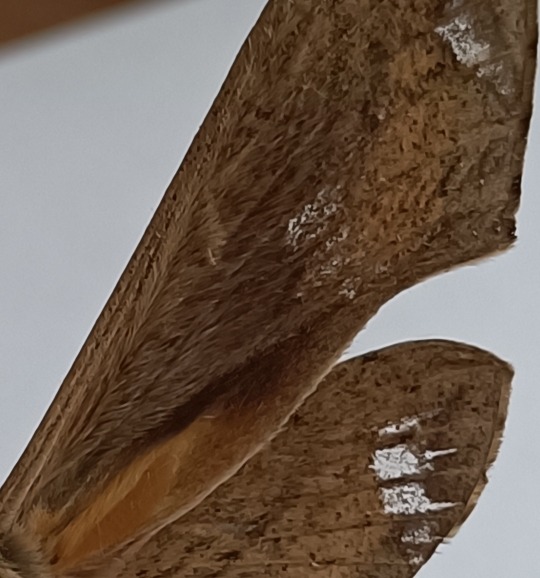

4 notes
·
View notes
Note
Hi, I think you're awesome, I am a fellow art and nature lover like you, also here's a caterpillar for you :)

Hello, how wonderful, nice to meet you.
wonderful find ✨👏.
It is a moth of the family Sphingidae, possibly genus Hippotion.
2 notes
·
View notes
Text
Major UNH Members
A brief list of the largest (by population) members of the interstellar United Nations of Humanity in the Astra Planeta canon.
United Sol System

System: Sol Seat: Gaea Station, Earth orbit Population: 12.78 billion
Centauri Republic

System: Alpha Centauri Seat: Chiron Station, Fortuna-Concordia circumbinary orbit Population: 18.45 billion
New Nations of Helios

System: Helios (Barnard's Star) Seat: Astraeus Station, Hemeran orbit Population: 9.56 billion
Dogstar Federation

Systems: Sirius, Procyon, Luyten's Star, Kapetyn's Star, Ross 614, Lucina, Itzpapalotl, Erra Seat: Remus Station, Procyon Prime orbit Population: 11.54 billion
Winds of Anemos

System: Anemos (HH Andromedae) Seat: Port Magellan, Hippotes, Tempest Belt Population: 3.4 billion
Pantheon Alliance

Systems: Olympia (AX Microscopii), Othrys (Lacaille 9352), Erebus (EZ Aquarii) Seat: None Population: 22.6 billion
Takamagahara Unitary Republic

System: Takamagahara (61 Cygni) Seat: Tengokyokai Station, Inari orbit Population: 7.08 billion
19 notes
·
View notes
Text
Names generated from the Danaides, their husbands and other family members
Achan Acherbia Achus Actamadus Actamas Actrate Adian Adicis Adifferene Adiochas Adnemphous Adnemus Adrysippusa Aeandicia Aeante Aegypetes Aegyptoris Aentinorino Aestes Aestra Agaptoleia Agaptolycus Agaptolyxo Agaptomius Agapton Agaptor Agaptus Agaptusa Agences Agene Alcermus Alceusippe Alcmedus Alcmenthe Alcor Alcorge Alcoria Alcoryas Alidice Alite Alixus Allia Allitus Amadne Amius Amphodor Ampus Ampusa Amymotes Analces Anterbe Antes Anthe Antistygne Arabia Aratlamphia Arator Arbelemus Arbia Arcelo Arcetes Archalce Archas Archent Archephaene Argene Argor Argorgius Argorgype Argype Artineleode Artinor Artistes Asthera Atestrus Atlaea Atlan Atolemenice Atomenorgor Atrus Aucheno Auchermne Auchrono Auchus Aucianorine Autolycus Automia Autor...
Bronorenes Brotes Brylo Brysiphippe Brysippus Brysthous Brystygne Caete Calce Calcete Calcme Calcmedus Calcor Calia Calixus Celeodoria Celus Cerbe Cethoeno Chaea Chaegius Chaegyperse Chalianoene Chamia Chandices Chante Charge Chenes Chron Chropetus Chropirence Chrotaestis Chryadryste Chryads Chryce Chthea Chthermusa Chusa Cippodice Cippus Clectaea Clectamad Cleia Cleian Clemencetus Clementeste Clempus Cleodon Cleodor Cleopate Clidartino Clids Clixus Criant Criopantino Daidamymon Daippus Damadne Damymon Damymotes Dandice Darbiad Darce Dartinelus Daste Diceuryas Diceus Dicis Differippe Dionor Diopate Diopera Dioperatra Diopete Diopia Dioxibia Diteia Dones Dryadiffere Dryadne Dryads Drydicia Drysiphaea Drysippe Drysiriano Elaenempus Elanalcodia Elara Elarchus Elarge Eleia Eleian Elempus Eleode Elephampus Elusirene Enaia Eneleodan Eriadus Erineusiris Erippe Ethoebe Ethoenorge Eucermus Eucipperion Eucippetus Eucippode Euromatrus Euron Euryadne Euryas Eurystra Eurystrusa Eviphant Evippodon Evippomate Gladiocor Gladus Glaegype Glamas Glant Glarcetes Glargo Glaus Glautoris Gopato Goperse Gopethoence Gophant Gorgius Goriadus Gorione Gorysiris Goryste Gorystra Haene Hamadus Hampus Hantes Helan Henaxippe Hence Henelusa Henes Henicis Henor Henorgor Henthences Hephan Hepharge Hephoebe Herbius Heris Hiads Hiantheleia Himedus Himemus Hiochelus Hione Hioxippe Hiphaes Hiphalce Hiphamano Hiphippe Hiphippete Hiphon Hiphousa Hippe Hipperce Hipperian Hipperis Hippochus Hippodamas Hippodon Hippodor Hippolyce Hippomius Hippote Hippothe Hippus Hisse Hypereno Hypermne Hypermus Hyphipperis Hyphon Hyptolyxo Hyptomedus Idamote Idant Idarce Idiocor Idmonice Imedus Imempus Iment Iphis Iphode Iphodon Ippole Ippolectons Ippolycus Ippusire Istes Istestes Isthone Istra Largius Lites Lycelephode Lycelo Lyctomas Lycusa Lynce Lynces Lyncete Lytus Medus Menceus Mnelara Mnelus Mneste Monemedus Motaea Motheleiads Naidion Naids Naippolytus Nalce Naxibia Naxippe Nelaus Nelus Noenaxibia Norge Ocodant Ocore Ocorge Ocoryad Ocype Ocypeteste Oemads Oeman Oematestra Oementes Oemus Oenelus Oenor Oenorge Orgopatra Orgor Oryste Pantes Panthelusa Patermus Pateuromas Patlara Patrus Perine Peris Permusa Phaes Phaete Phamymonius Phandian Pharbelauto Pharce Pharge Phippe Phippole Phode Phodices Phoditus Phoematra Phous Phrydas Phrysiria Piadion Pieriphoebe Piermne Pierseurylo Pireneus Pirenor Pirenorgius Pirentino Piria Piris Pochenempus Pochus Podano Podargo Podianor Podiceleope Podiceus Podions Podonius Podons Polepharce Polyce Polycus Polynce Polytus Polytusa Potaene Potaete Potamymon Poteian Pothe Pothenempus Pothime Promemano Prone Pronius Prons Propiermnes Pylartis Pylocoria Pylocype Rhodas Rhodor Rhoemus Rhoenalce Rhoeno Rhone Rhous Scaete Scaetes Scalce Scalcmedus Scalcmedusa Sonicippe Steurystine Sthenius Stheniusa Stistygnes Stygnelaea Styria Theladus Thelano Thelochron Thenelus Thenes Thenestis Theno Thepharbius Thephous Theria Therines Therse Thodantes Thoemus Thous Tygne Tyrioxibius Womene Womia
1 note
·
View note